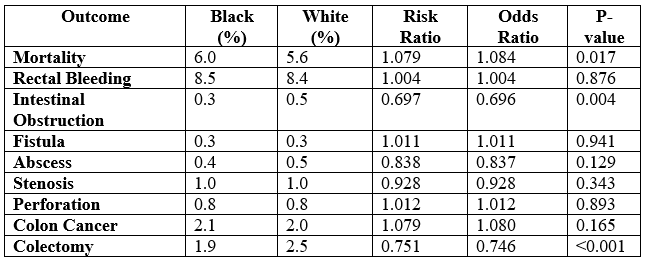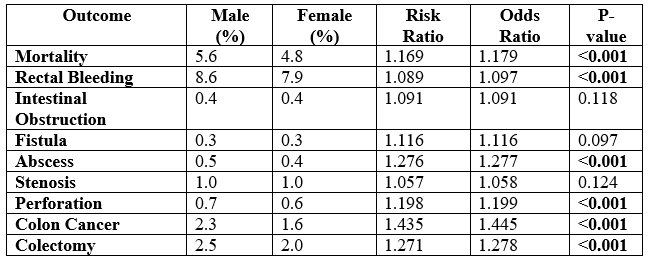Sunday Poster Session
Category: IBD
P1074 - Disparities in Ulcerative Colitis Complications by Race and Gender: A Multicenter Propensity-Matched Cohort Study
Sunday, October 26, 2025
3:30 PM - 7:00 PM PDT
Location: Exhibit Hall

Kobina Essilfie-Quaye, MD (he/him/his)
University of Central Florida, HCA Healthcare GME
Gainesville, FL
Presenting Author(s)
Kobina Essilfie-Quaye, MD1, Omar Obeidat, MD1, Mohammad Abu Assi, MD2, Harsimran Kalsi, MD2, Carson Creamer, DO1, Iyad Al-Bustami, MD, MPH3, Marcus Muehlbauer, MD, PhD2
1University of Central Florida, HCA Healthcare GME, Gainesville, FL; 2University of Central Florida, Gainesville, FL; 3Brooklyn Hospital Center, Brooklyn, NY
Introduction: Racial and gender disparities in ulcerative colitis (UC) outcomes persist despite therapeutic advances. We evaluated differences in UC complications and interventions across racial and gender groups using a large, real-world electronic health record database.
Methods: We conducted a retrospective cohort study using the TriNetX database, analyzing adult patients (≥18 years) with a diagnosis of UC from 2010 to 2025. Propensity score matching was performed to compare cohorts of (1) Black vs White (N=32,121 each), (2) Hispanic vs White (N=19,928 each), and (3) Male vs Female (N=153,065 each). Primary outcomes included mortality, and UC-related complications such as development of colorectal cancer, rectal bleeding, intestinal obstruction, bowel perforation, and fistula formation. Risk ratios, odds ratios, and Kaplan-Meier survival analyses were employed.
Results: In the Black vs White cohort, Black patients had significantly higher all-cause mortality (6.0% vs 5.6%, OR 1.08, p=0.017) despite lower rates of colectomy (1.9% vs 2.5%, OR 0.75, p< 0.001). Rates of colon cancer and all other complications were similar between the two groups. In the Hispanic vs White cohort, Hispanic patients exhibited significantly higher rates of rectal bleeding (11.8% vs 9.8%, OR 1.23, p< 0.001), while all other complications did not reach statistical significance. Mortality and colectomy rates were not significantly different. Among male vs female patients, men had significantly higher mortality (5.6% vs 4.8%, OR 1.18, p< 0.001), colorectal cancer (2.3% vs 1.6%, OR 1.44, p< 0.001), and colectomy rates (2.5% vs 2.0%, OR 1.28, p< 0.001), along with increased risks of abscess, perforation, and rectal bleeding
Discussion: Despite similar UC complication rates and matched demographics, Black patients had significantly higher all-cause mortality and lower colectomy rates compared to White patients, suggesting systemic disparities and barriers to timely surgical and specialty care. Male patients also had higher risks of UC complications including colorectal cancer, perforation, surgery, and mortality, consistent with findings from prior studies. These findings highlight the need for equity-focused strategies that address both clinical management and the broader social factors influencing UC outcomes.

Figure: Comparison of Ulcerative Colitis Outcomes: Black vs White Patients (Propensity-Matched Cohort, N = 32,121 Each)

Figure: Comparison of Ulcerative Colitis Outcomes: Male vs Female Patients (Propensity-Matched Cohort, N = 153,065 Each)
Disclosures:
Kobina Essilfie-Quaye indicated no relevant financial relationships.
Omar Obeidat indicated no relevant financial relationships.
Mohammad Abu Assi indicated no relevant financial relationships.
Harsimran Kalsi indicated no relevant financial relationships.
Carson Creamer indicated no relevant financial relationships.
Iyad Al-Bustami indicated no relevant financial relationships.
Marcus Muehlbauer indicated no relevant financial relationships.
Kobina Essilfie-Quaye, MD1, Omar Obeidat, MD1, Mohammad Abu Assi, MD2, Harsimran Kalsi, MD2, Carson Creamer, DO1, Iyad Al-Bustami, MD, MPH3, Marcus Muehlbauer, MD, PhD2. P1074 - Disparities in Ulcerative Colitis Complications by Race and Gender: A Multicenter Propensity-Matched Cohort Study, ACG 2025 Annual Scientific Meeting Abstracts. Phoenix, AZ: American College of Gastroenterology.
1University of Central Florida, HCA Healthcare GME, Gainesville, FL; 2University of Central Florida, Gainesville, FL; 3Brooklyn Hospital Center, Brooklyn, NY
Introduction: Racial and gender disparities in ulcerative colitis (UC) outcomes persist despite therapeutic advances. We evaluated differences in UC complications and interventions across racial and gender groups using a large, real-world electronic health record database.
Methods: We conducted a retrospective cohort study using the TriNetX database, analyzing adult patients (≥18 years) with a diagnosis of UC from 2010 to 2025. Propensity score matching was performed to compare cohorts of (1) Black vs White (N=32,121 each), (2) Hispanic vs White (N=19,928 each), and (3) Male vs Female (N=153,065 each). Primary outcomes included mortality, and UC-related complications such as development of colorectal cancer, rectal bleeding, intestinal obstruction, bowel perforation, and fistula formation. Risk ratios, odds ratios, and Kaplan-Meier survival analyses were employed.
Results: In the Black vs White cohort, Black patients had significantly higher all-cause mortality (6.0% vs 5.6%, OR 1.08, p=0.017) despite lower rates of colectomy (1.9% vs 2.5%, OR 0.75, p< 0.001). Rates of colon cancer and all other complications were similar between the two groups. In the Hispanic vs White cohort, Hispanic patients exhibited significantly higher rates of rectal bleeding (11.8% vs 9.8%, OR 1.23, p< 0.001), while all other complications did not reach statistical significance. Mortality and colectomy rates were not significantly different. Among male vs female patients, men had significantly higher mortality (5.6% vs 4.8%, OR 1.18, p< 0.001), colorectal cancer (2.3% vs 1.6%, OR 1.44, p< 0.001), and colectomy rates (2.5% vs 2.0%, OR 1.28, p< 0.001), along with increased risks of abscess, perforation, and rectal bleeding
Discussion: Despite similar UC complication rates and matched demographics, Black patients had significantly higher all-cause mortality and lower colectomy rates compared to White patients, suggesting systemic disparities and barriers to timely surgical and specialty care. Male patients also had higher risks of UC complications including colorectal cancer, perforation, surgery, and mortality, consistent with findings from prior studies. These findings highlight the need for equity-focused strategies that address both clinical management and the broader social factors influencing UC outcomes.

Figure: Comparison of Ulcerative Colitis Outcomes: Black vs White Patients (Propensity-Matched Cohort, N = 32,121 Each)

Figure: Comparison of Ulcerative Colitis Outcomes: Male vs Female Patients (Propensity-Matched Cohort, N = 153,065 Each)
Disclosures:
Kobina Essilfie-Quaye indicated no relevant financial relationships.
Omar Obeidat indicated no relevant financial relationships.
Mohammad Abu Assi indicated no relevant financial relationships.
Harsimran Kalsi indicated no relevant financial relationships.
Carson Creamer indicated no relevant financial relationships.
Iyad Al-Bustami indicated no relevant financial relationships.
Marcus Muehlbauer indicated no relevant financial relationships.
Kobina Essilfie-Quaye, MD1, Omar Obeidat, MD1, Mohammad Abu Assi, MD2, Harsimran Kalsi, MD2, Carson Creamer, DO1, Iyad Al-Bustami, MD, MPH3, Marcus Muehlbauer, MD, PhD2. P1074 - Disparities in Ulcerative Colitis Complications by Race and Gender: A Multicenter Propensity-Matched Cohort Study, ACG 2025 Annual Scientific Meeting Abstracts. Phoenix, AZ: American College of Gastroenterology.

